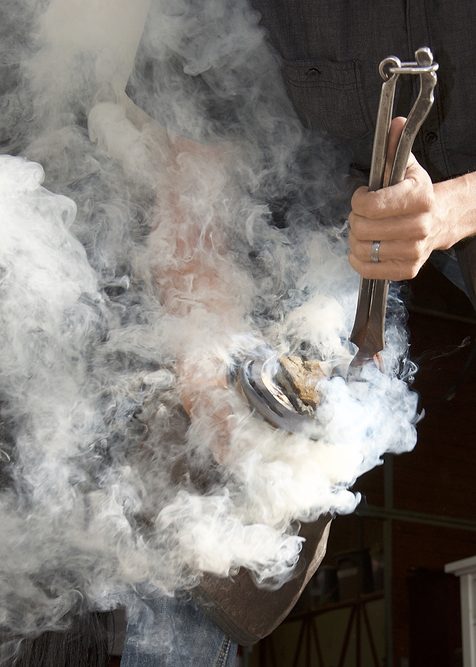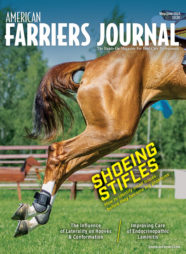In the midst of the COVID-19 global pandemic, farriers are less likely to be exposed to the coronavirus in your day-to-day work than most workers. Yet, that doesn’t mean you won’t be exposed to it.
Although horses can become infected with the equine enteric coronavirus (EEC), it is not the same as COVID-19.
EEC can cause both respiratory and enteric (or intestinal) signs of disease. It is transmitted when horses ingest the virus through the feces of another horse, according to the Cornell University College of Veterinary Medicine. Common clinical signs include anorexia; lethargy; fever; changes in fecal character (soft) and profuse diarrhea in more extreme cases; leukopenia secondary to neutropenia or lymphopenia; hypoalbunemia and neurologic abnormalities, such as ataxia, depression and recumbency, secondary to hyperammonemia. Death is typically rare.
Both the World Health Organization (WHO) and the Centers for Disease Control and Prevention (CDC) state there is no evidence that companion animals, including pets, can become ill from COVID-19.
“The Center for Disease Control and Prevention infectious disease experts, and multiple international and national human and animal health organizations have stated that, at this time, there is no evidence to indicate that horses could contract COVID-19 or that horses would be able to spread the disease to other animals or humans,” according to equine veterinarians at Palm Beach Equine Clinic.
Although, pets “can have the the virus on them if they are in an environment with a large quantity of the virus and could serve to be a source of the virus for other people,” according to the College of Veterinary Medicine at the University of Illinois.
Despite this, the American Veterinary Medical Association (AVMA) recommends that if you are ill, you should not interact with animals.
“Out of an abundance of caution, it is recommended that those ill with COVID-19 limit contact with animals until more information is known about the virus,” according to the AVMA. “Have another member of your household take care of walking, feeding and playing with your pet. If you have a service animal or you must care for your pet, then wear a facemark; don’t share food, kiss or hug them; and wash your hands before and after any contact with them.”
COVID-19 is a respiratory disease that originated in China and has now been detected in more than 100 locations internationally, according to the CDC. The virus has been named SARS-CoV-2 and the disease it causes is coronavirus disease 2019, or abbreviated COVID-19. The International Health Regulations Emergency Committee of the World Health Organization (WHO) declared on Jan. 30, 2020, the outbreak a public health emergency of international concern. WHO characterized COVID-19 a pandemic on March 11. President Donald Trump declared the outbreak a national emergency 2 days later.
Patients can experience fever, cough and shortness of breath 2 to 14 days after exposure to COVID-19. Illnesses have ranged from mild symptoms to severe illness and death. Emergency warning signs include difficulty breathing or shortness of breath, persistent pain or pressure in the chest, new confusion or inability to arouse, and/or bluish lips or face. As of Monday morning, at least 3,602 people in 49 states; Washington, D.C.; and three U.S. territories have tested positive. At least 66 have died. Only West Virginia has not reported a positive result.
The virus is believed to spread mainly from people who are within about 6 feet of one another and through respiratory droplets that are produced when an infected person coughs or sneezes. The CDC recommends that you take steps to protect yourself and others by:
- Washing your hands often with soap and water for at least 20 seconds, especially after being in a public place, blowing your nose, coughing or sneezing.
- If soap and water is not readily available, use a hand sanitizer that contains at least 60% alcohol.
- Avoid touching your eyes, nose and mouth with unwashed hands.
- Stay at home if you’re sick, except to get medical care.
- Cover your mouth and nose with a tissue or the inside of your elbow when you cough or sneeze.
- Clean and disinfect frequently touched surfaces daily.
In hopes of avoiding transmission of the virus, Cicero, Ind., farrier Cody Bogard has been proactive in communicating with his clients about how he will operate his business during this time.
“In our normal operations,” Bogard tells his clients, “we are already stringent about washing hands between clients and require that everyone let us know before we get to the barn of any illness so that we can reschedule.”
In addition, Bogard has implemented these policies and notified his clientele.
- Increased disinfecting between clients.
- Limiting contact with people, including no handshakes.
- Receiving payment via email invoice by credit card or bank transfer rather than by cash or check.
“Our commitment,” Bogard says, “has been and will continue to be the utmost care for our clients in every way.”
The Ontario Animal Health Network created a downloadable resource to help horse owners care for their animals during a pandemic.








Post a comment
Report Abusive Comment